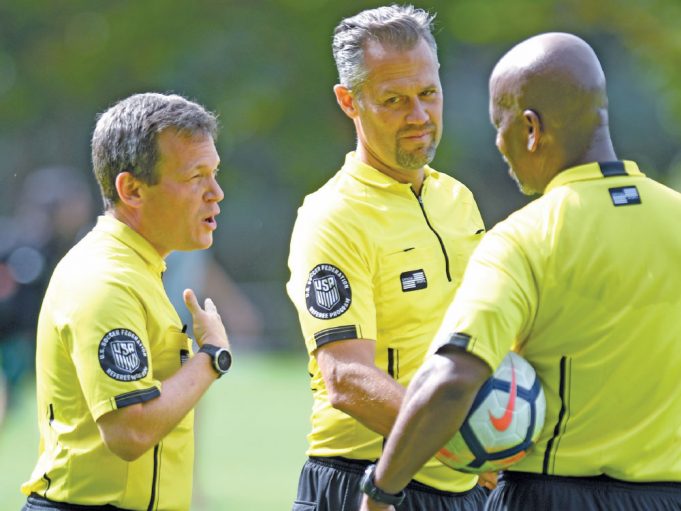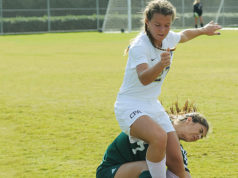Through three decades and nearly 3,000 games of my officiating career, I’ve accumulated insights, notions and generalizations I didn’t have before which I can trace back to having been an official — skills for a lifetime both major and minor.
Becoming an instructor and assessor had the effect of accelerating the process because, in those capacities, I had the additional responsibility of explaining what I learned from others. While I would not suggest the process is over, I recently reflected on and tried to put into some concrete, coherent form what those lessons are. In doing so, I realized that many had far-reaching implications beyond the field.
Life is not fair
It is not wrong to strive for perfection, but do not lose sight of the fact that, in broad terms, it can never be achieved. Imperfections have costs, many of which are paid by others. I will make mistakes on the field, others will see them and, quite possibly, comment upon them. My job is to hold mistakes to a minimum, to learn from those which happen and to make the consequences to others more tolerable.
That lesson would be much easier to implement if it were shared in equal measure by players, coaches and spectators. It is not. And, realistically, perhaps it never can be because those other participants approach the game from different perspectives (both conceptually and literally). Their perspective is neither more nor less valid than mine, and all are necessary for the game to be played.
That is true even of spectators, whom we often ignore as unnecessary but who ultimately, directly or indirectly, supply the practical resources which make the game possible. After all, they are a big factor in the contemporary trend toward encouraging conditions that support attacking, goal-scoring soccer.
Making decisions and getting them right is a delicate balance
I started off as an arrogant referee (I came to officiating as an adult rather than having started much younger.). I remember the first time I publically admitted that I had made a mistake. It was on a U-14 recreational boys’ match and I had given one team the free kick restart for a foul committed by an opponent. I saw one of the assistant referees (AR) trying to get my attention and, by gestures, suggesting I had reversed the teams. The following thoughts went through my head: (a) the information was coming from an AR but I was the referee, (b) I had already made the decision, (c) the team I had awarded the restart to was about to kick and stopping the process would create confusion, and (d) admitting my mistake would erode confidence in me.
Quite likely, I had faced that situation before but that time, for reasons that I still cannot articulate, I called the ball back, walked over to the AR and asked what he had seen. Based on his information, I realized the mistake and made it right. I briefly explained to the players what I was doing and why.
The world did not fall apart. Correcting my error publicly did not appear to have adversely affected my subsequent control of the match. On the other hand, I can’t say it helped me either. But I did get it right and, in doing so, I realized not only that I felt better but that I had at least one AR who felt better about himself as well.
That was not the end of the lesson. A season or two later, I was faced with a situation in which a ball left the field across the goalline and the restart would, of course, be determined by which team last made contact with it. I am sure to this day that I “saw” the ball touch a defender as it went out. The AR signaled for a goalkick. A defender retrieved the ball and began placing it for a goalkick. All the opponents began positioning themselves for a goalkick.
Prior to that, I would have whistled to get everyone’s attention and signaled instead for a corner kick based on my certain knowledge that I had seen something no one else had and that, darn it, it was the correct decision. Fortunately, I hesitated. The inside war raged momentarily. On the one hand — certainty as to the facts, confidence in my training and the conviction that “getting it right” was the most important objective. On the other hand — I was the only one with that knowledge, both the AR and the players from both teams were accepting the goalkick and “getting it right” would entail explanations, delay and perhaps, disbelief. I let it go.
Since then, I have used that scenario in senior referee training to hash out what “getting it right” means in the context of an actual game. There is “right” and then there is right. Some of the “hashing out” gets rather heated.
Location, location, location
Although that is supposedly the first rule of real estate, it is also the first rule of officiating. What we decide is based on what we see — and what we see is based on where we are. The referee has only one pair of eyes. Adding ARs gives two more pairs of eyes, plus the even more significant addition of different angles. Toss in a fourth official and experimental “additional assistant referees” and we remain outnumbered by the players, coaches and spectators.
Of course, they are, collectively, going to see things that we, collectively, don’t see. Of course, what we see is informed by our training, neutrality and experience whereas what they see is informed by passion and partisanship.
So our information is of higher quality … but they have a lot more of it. Get over it. Short of stopping every few minutes to “look at the video” (ugh!), that will never change. I am thankful for that because it means, first, we must recognize the critical importance of striving for good positioning and, second, we must assess our professional capabilities accordingly. “Positioning” is never a matter of being at any certain place — it is a matter of seeing what most needs to be seen. All the diagrams, visuals, clips, systems, theories, etc., about positioning are little more than attempts to generalize across many different games involving players and coaching strategies at a certain (usually very high) level of competitive skill. They may or may not be helpful to you today in this game. Study them, yes. Be a slave to them, no.
Important for the long term, however, is the lesson that we need to adjust our professional expectations regarding assignments based on a realistic evaluation of our ability to match our positioning to the needs of the game. If we are not “seeing what most needs to be seen,” we are not doing that game any good and we need to start doing different games. That is true both in the short-term (temporary injuries, for example) and the long-term (general decline in fitness). That is a hard lesson but it is one that must be learned.
There are other things I have learned arising from my experience as a referee. I have been particularly pleased when one or more of those lessons slipped over into and helped me in my work and family life. Think about what you have learned and thank soccer for the chance to grow.
What's Your Call? Leave a Comment:
Note: This article is archival in nature. Rules, interpretations, mechanics, philosophies and other information may or may not be correct for the current year.
This article is the copyright of ©Referee Enterprises, Inc., and may not be republished in whole or in part online, in print or in any capacity without expressed written permission from Referee. The article is made available for educational use by individuals.


















